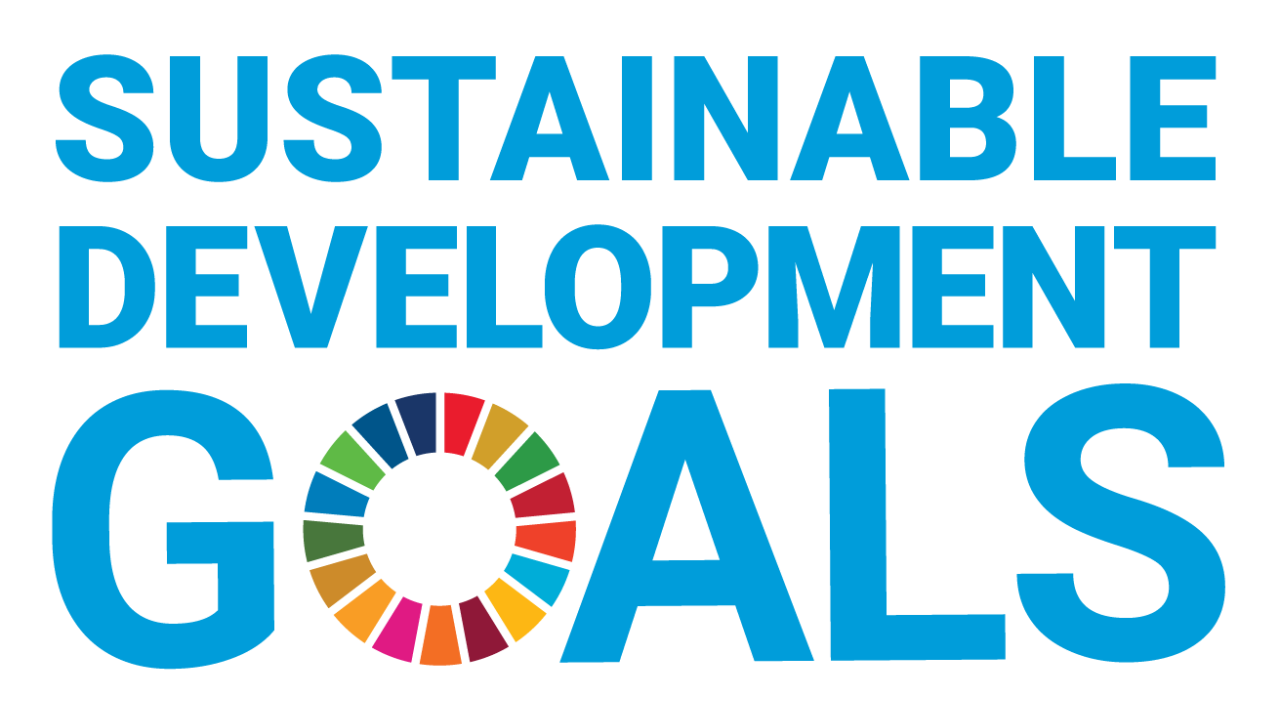
The UN Sustainable Development Goals and Feed the Future Research on Rural Resilience
The United Nations Sustainable Development Goals (SDGs) build a pathway to improving life for all people while safeguarding the environment in which we all live. A critical part of this work is to build opportunities for rural families whose lives and livelihoods have always been the most vulnerable.
The Feed the Future Innovation Lab for Markets, Risk & Resilience (MRR) at UC Davis develops and tests ways for rural families in developing countries to improve their livelihoods and resilience. These families depend on the food they can produce on their own, a livelihood that is incredibly vulnerable to the effects of climate change, like extreme drought, flood and other weather-related disasters.
While the MRR Innovation Lab research program is funded by USAID to support the U.S. Global Food Security Strategy, its mission strongly overlaps with a number of the SDGs. Research to empower rural families with new and expanded opportunities for food security and resilience contributes directly to achieving those goals.
Right now, MRR Innovation Lab researcher collaborations encompass 16 projects in 11 countries that build evidence on crop and livestock insurance, comprehensive livelihood building programs, microfinance, community decision making, digital advisories, seed genotyping and many other promising ideas that build rural resilience. Each of these projects seeks to create scalable opportunities for rural families to sustainably escape poverty and become food secure.
Each SDG has targets that build concrete pathways to success. Here are some of our projects and the SDG targets they contribute to achieving. (See below for the full list and description of MRR-aligned SDG targets.)
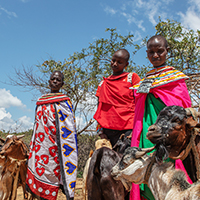
A Randomized Evaluation of an Integrated Graduation and Contingent Social Protection Program in Kenya
The human and economic consequences of extreme drought are potentially enormous. The accumulating costs as families struggle to recover are substantial, including the impacts of cutting spending on food and children’s education. In Kenya, an MRR Innovation Lab project led from UC Davis and the International Livestock Research Institute (ILRI) is pairing index-based livestock insurance with The BOMA Project's successful poverty graduation program for women to ensure that they can hold onto their gains even through a severe drought. In 2020, the project expanded to study the impacts of the Covid-19 pandemic on the project’s participants and their access to broader markets. Learn more
Aligned with SDG targets 1.1, 1.2, 1.3, 1.4, 1.5, 2.1, 2.2, 2.3, 5.5, 8.3, 8.10, 10.1, 10.2, 13.1, 13.3, 13.b
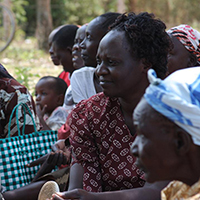
Impact of Agro-Weather and Market Information on Productivity and Resilience in Farming Communities in Kenya
Timely and accurate information can empower small-scale farmers and pastoralists to take steps to adapt to climate change and secure resilient livelihoods. The Government of Kenya has launched a project that includes agro-weather and market advisories in an effort to promote the adoption of climate-smart approaches to enhancing productivity and building resilience. An MRR Innovation Lab project led from the Tegemeo Institute of Agricultural Policy and Development has launched a comprehensive study to provide the first evidence from a national program on the impact these advisories have on farmers’ decision making, including for women and poor families. Learn more
Aligned with SDG targets 1.1, 1.5, 1.b, 2.1, 2.4, 5.b, 10.1, 10.2, 13.1, 13.3, 13.b
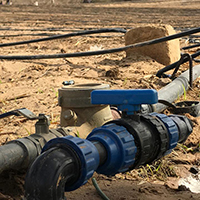
Irrigation, Property Rights and Land Markets for Resilient Growth in Rwanda and Senegal
Irrigation may be the most effective way to achieve higher and more resilient agricultural yields, farm incomes and household well-being. Yet, in many regions of the world where agriculture is key for growth and rural poverty is concentrated, little irrigation is used and use is significantly below optimum. An MRR Innovation Lab project in Rwanda and Senegal, led from UC Berkeley and Université Gaston Berger, explores how stronger property rights and better-functioning land and labor markets can maximize the potential of large-scale irrigation projects to generate agricultural growth and resilience in rural communities. Learn more
Aligned with SDG targets 1.1, 1.2, 1.4, 1.5, 1.b, 2.1, 2.2, 2.3, 2.4, 2.a, 8.3, 10.1, 13.1, 13.3, 13.b, 15.1
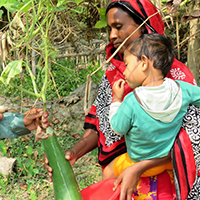
Gender, Nutrition-Sensitive Agricultural Programs and Resilience in Bangladesh
Resilience has become a major focus of development efforts worldwide but there remains a limited body of field-tested evidence to guide what types of programs can help agricultural families to achieve resilience. An MRR Innovation Lab project led from Cornell University and the International Food Policy Research Institute (IFPRI) returns a research team to Bangladesh to evaluate whether the improvements generated by a three-year program to promote agricultural diversity, increase income, improve nutrition and empower women sustained after a devastating cyclone. Learn more
Aligned with SDG targets 1.1, 1.2, 1.3, 1.5, 1.b, 2.1, 2.2, 2.a, 5.5, 10.1, 10.2, 13.1, 13.3, 13.b
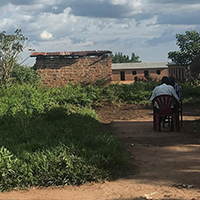
Assessing Seed System Resilience with Structured Genotyping in Uganda
Recent studies suggest that Uganda’s seed systems supply farmers with low-quality seeds, undermining their productivity and resilience. An MRR Innovation Lab project led from UC Davis, the International Center for Tropical Agriculture (CIAT), the CGIAR Standing Panel on Impact Assessment (SPIA) and the International Food Policy Research Institute (IFPRI) is the first comprehensive, nationally-representative and rigorous study of the genetic integrity of the maize and bean seed systems in Uganda. The research team is leveraging recent advances in DNA fingerprinting to test maize and bean seeds from across supply chains to identify leaks responsible for low-quality seeds reaching farms. The results will provide directed policy to enhance seed system resilience in Uganda. Learn more
Aligned with SDG targets 1.1, 1.2, 1.4, 1.5, 1.b, 2.1, 2.2, 2.3, 2.4, 2.a, 2.c, 8.3, 10.1, 10.2, 13.1, 13.b
MRR-aligned SDG Targets
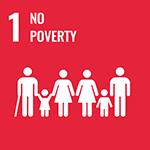
SDG 1: No Poverty
End poverty in all its forms everywhere.
Target 1.1: By 2030, eradicate extreme poverty for all people everywhere, currently measured as people living on less than $1.25 a day.
Target 1.2: By 2030, reduce at least by half the proportion of men, women and children of all ages living in poverty in all its dimensions according to national definitions.
Target 1.3: Implement nationally appropriate social protection systems and measures for all, including floors, and by 2030 achieve substantial coverage of the poor and the vulnerable.
Target 1.4: By 2030, ensure that all men and women, in particular the poor and the vulnerable, have equal rights to economic resources, as well as access to basic services, ownership and control over land and other forms of property, inheritance, natural resources, appropriate new technology and financial services, including microfinance.
Target 1.5: By 2030, build the resilience of the poor and those in vulnerable situations and reduce their exposure and vulnerability to climate-related extreme events and other economic, social and environmental shocks and disasters.
Target 1.b: Create sound policy frameworks at the national, regional and international levels, based on pro-poor and gender-sensitive development strategies, to support accelerated investment in poverty eradication actions.
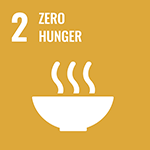
SDG 2: Zero Hunger
End hunger, achieve food security and improved nutrition and promote sustainable agriculture.
Target 2.1: By 2030, end hunger and ensure access by all people, in particular the poor and people in vulnerable situations, including infants, to safe, nutritious and sufficient food all year round.
Target 2.2: By 2030, end all forms of malnutrition, including achieving, by 2025, the internationally agreed targets on stunting and wasting in children under 5 years of age, and address the nutritional needs of adolescent girls, pregnant and lactating women and older persons.
Target 2.3: By 2030, double the agricultural productivity and incomes of small-scale food producers, in particular women, indigenous peoples, family farmers, pastoralists and fishers, including through secure and equal access to land, other productive resources and inputs, knowledge, financial services, markets and opportunities for value addition and non-farm employment.
Target 2.4: By 2030, ensure sustainable food production systems and implement resilient agricultural practices that increase productivity and production, that help maintain ecosystems, that strengthen capacity for adaptation to climate change, extreme weather, drought, flooding and other disasters and that progressively improve land and soil quality.
Target 2.a: Increase investment, including through enhanced international cooperation, in rural infrastructure, agricultural research and extension services, technology development and plant and livestock gene banks in order to enhance agricultural productive capacity in developing countries, in particular least developed countries.
Target 2.c: Adopt measures to ensure the proper functioning of food commodity markets and their derivatives and facilitate timely access to market information, including on food reserves, in order to help limit extreme food price volatility.
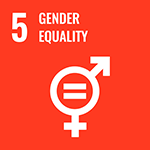
SDG 5: Gender Equality
Achieve gender equality and empower all women and girls.
Target 5.5: Ensure women’s full and effective participation and equal opportunities for leadership at all levels of decision-making in political, economic and public life.
Target 5.b: Enhance the use of enabling technology, in particular information and communications technology, to promote the empowerment of women.
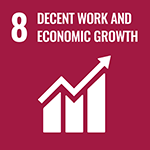
SDG 8: Decent Work and Economic Growth
Promote sustained, inclusive and sustainable economic growth, full and productive employment and decent work for all.
Target 8.3: Promote development-oriented policies that support productive activities, decent job creation, entrepreneurship, creativity and innovation, and encourage the formalization and growth of micro-, small- and medium-sized enterprises, including through access to financial services
Target 8.10: Strengthen the capacity of domestic financial institutions to encourage and expand access to banking, insurance and financial services for all.
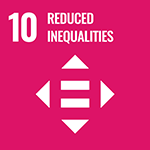
SDG 10: Reduced Inequalities
Reduce inequality within and among countries.
Target 10.1: By 2030, progressively achieve and sustain income growth of the bottom 40 per cent of the population at a rate higher than the national average.
Target 10.2: By 2030, empower and promote the social, economic and political inclusion of all, irrespective of age, sex, disability, race, ethnicity, origin, religion or economic or other status.
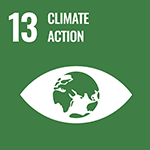
SDG 13: Climate Action
Take urgent action to combat climate change and its impacts.
Target 13.1: Strengthen resilience and adaptive capacity to climate-related hazards and natural disasters in all countries.
Target 13.3: Improve education, awareness-raising and human and institutional capacity on climate change mitigation, adaptation, impact reduction and early warning.
Target 13.b: Promote mechanisms for raising capacity for effective climate change-related planning and management in least developed countries and small island developing States, including focusing on women, youth and local and marginalized communities.
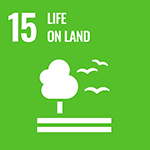
SDG 15: Life on Land
Protect, restore and promote sustainable use of terrestrial ecosystems, sustainably manage forests, combat desertification, and halt and reverse land degradation and halt biodiversity loss.
Target 15.1: By 2020, ensure the conservation, restoration and sustainable use of terrestrial and inland freshwater ecosystems and their services, in particular forests, wetlands, mountains and drylands, in line with obligations under international agreements.
Learn more about the United Nations Sustainable Development Goals.
